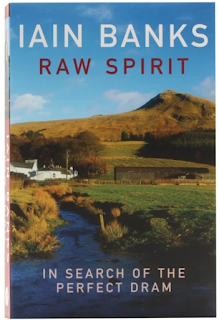Iain Banks, Raw Spirit
My memory of reading Iain Banks, which so far unaccountably is only The Hydrgen Sonata, has long told me that I really like him as a writer. When I revisited this morning my own review from many years ago, however, I was surprised to see that I was misremembering, so maybe I'll have to read more of his Culture novels.
In the meantime, I've now also read his nonfiction Raw Spirit: In Search of the Perfect Dram, and came away both enthralled (especially at first) and let down (though only toward book's end, really), which I think wouldn't trouble him even a whit.
At the height of Banks' success, his agent calls up to ask if he'd be interested in a proposal she'd received, that would see Banks driving around Scotland trying to visit every single distillery to compare their various Scotches. Banks' interest knew no bounds: "I was so excited I think I took my feet off the desk" (p18), and with that, he was off.There's lots to appreciate about Raw Spirit, absolutely. If you're interested in Scotch, whisky, whiskey, or Scotland, this book needs to be on your radar, full stop. It may turn out that, as it did for me, that the book won't give you what you were hoping for, but even so, if those are your interests, I suspect that you'll find it well worth the read.
If you like cars and driving, mind you, this book is for you even if you don't like Scotch, and you'll probably adore that element of Raw Spirit.
Above all else, this book's about Scotch. This means that there's a ton of fascinating info about distillery construction, tasting notes, the topography of peat and stream, and that's what I was there for. Given that his travels took place in 2003, more than 20 years ago, he's writing about Scotches that are no longer available and will never be replicated, which gives the whole affair an extra layer of myth and nostalgia and wish-fulfilment. He writes about some distilleries that have since closed; he notes some lost distilleries that have re-opened since his book was published. All this makes it an irreplaceable classic, like H.V. Morton's 1930s travel books, but about a Scotch-centric view of Scotland.
It's also about Banks himself, and I loved the thread of his opposition to the early-2000s war in Iraq. We need to remember those times, and its persistent but seemingly stray appearance in this book was so very welcome to me.
It's also a travel book about Scotland, which is almost always going to be worth your time. Banks shares lots of intimate detail about various roads and lochs and towns, not to mention character sketches of all manner of people, and he does a great job of sharing the experience with you.
Unexpectedly, for me at least, it's also a book about cars. I had no idea that Banks was a petrol-head, but on the evidence, it's kind of hard to imagine there was room in his head for anything else. He had a variously morphing collection of vehicles, from niche to luxury, that he seems to have driven entirely without regard for speed limits. There are paeans to his various BMW's, and one to his Land Rover Defender (that actually I really enjoyed), among others. Pages and pages go by where he does nothing but talk about the roads he's driving, and why he enjoys driving them, and how he drives them, and experiences he's had driving them, and....
Sometimes I flipped ahead to find the Scotch, or at least to find a place that wasn't simply zipping past a vehicle's side windows.
The first 200 pages, I found myself chuckling, nodding, and recommending it to others. (The old "Listen to this bit" gambit, even!)
But by the last 100 or so, I was tired.
Banks' prose is sharp, but I kept finding myself thinking of Douglas Adams. They were both Brits of the same generation, more or less, both writing science fiction along with some nonfiction, and they shared some of the same turns of phrase and senses of humour.
I love Douglas Adams. Based on the evidence, I don't know that I'll do more than mildly enjoy Iain Banks.

Comments